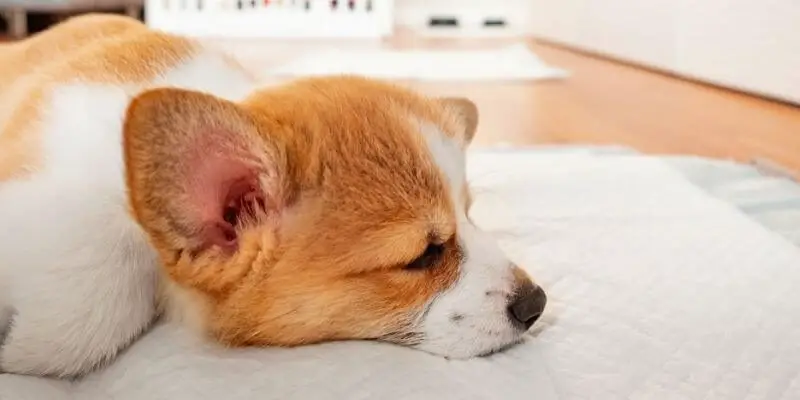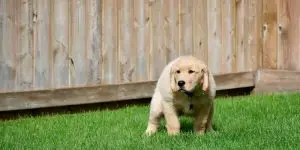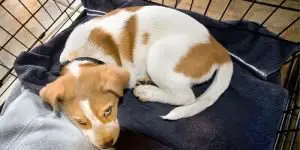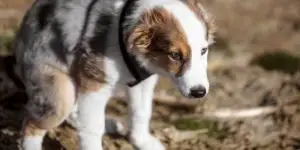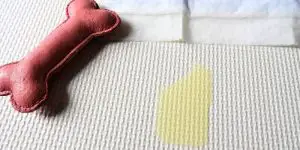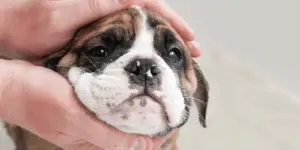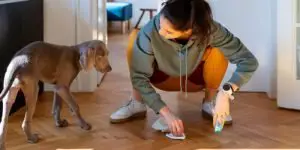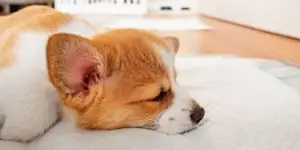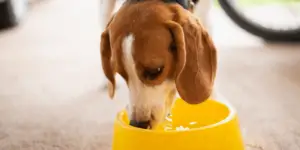
Do puppies pee in their sleep?
Like babies, puppies don’t have all of their reflexes developed when they are very young. It takes time for the bladder muscles to develop and for them to understand that they can’t just go anywhere in your house.
House training also requires a bit of time and effort on the part of pet owners, and it is a task that can take up to several weeks. It is, therefore, normal for puppies to pee in their sleep, especially during the first six to eight weeks of their life.

Ask the Vet - My puppy is peeing in their sleep - is it normal?
"It isn’t normal for a puppy to pee when they’re asleep. While a puppy may pee inside or in their crate while you sleep, they should always be awake when they pass urine. Any urine passed while sleeping warrants a vet visit as it may be a sign of a neurological disorder, urinary infection or a weak sphincter muscle."
- Dr Linda Simon MVB MRCVS
Reasons why a puppy would pee in their sleep
Lack of house training or an overly full bladder
First of all, you shouldn’t think that puppies pee in their sleep on purpose. This is a behavior that happens purely out of instinct.
Puppies become capable of holding themselves from peeing everywhere as they grow. It’s estimated that they become able to hold one extra hour for every additional month of their age.
Therefore, by the time they get to be 1-year-old, they should pee twice or three times per day without having any accidents.
House training is essential and can take a long time. During this process, you will effectively be teaching the puppy first to pee in a designated place in your home (especially if your pet is younger than 6 weeks and isn’t even allowed to go outdoors yet) and then to pee when you take them out for walks.
Even the best dogs can have accidents in their sleep if they’ve had a lot of water before they go to bed and they are very tired. However, adult dogs should experience this mishap as rarely as possible if they are not sick.
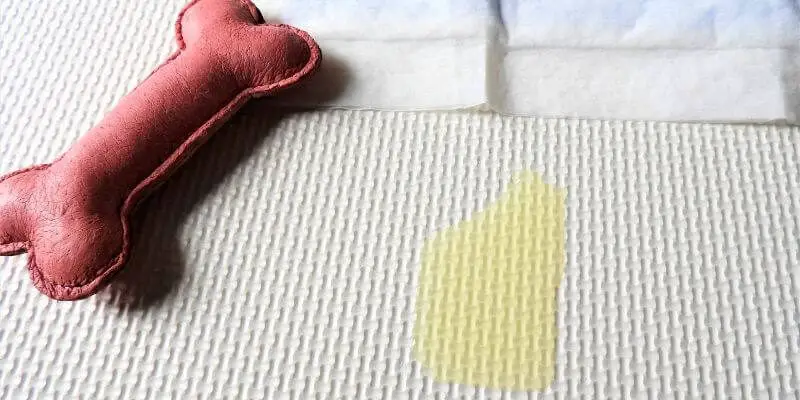
Spaying or neutering
Early spaying or neutering can lead to urinary incontinence as a result of the hormonal balance inside your puppy’s body suffering from significant changes.
While intact male dogs have plenty of testosterone (and their female counterparts, estrogen) running through their blood, that will no longer be the case after the operation.
What’s interesting about estrogen and testosterone is that they actually sustain the flexibility and firmness of the urinary bladder walls, which means that puppies that are spayed early have a higher likelihood of experiencing urinary incontinence than dogs that are ‘fixed’ later on in life.
Urinary tract infections
Also known as UTIs, these are pesky health issues that tend to affect dogs at least once in their lifetime. Female dogs are more prone to developing them because of the way they sit when they ‘go to the bathroom’.
Their nether region touches the surface of the ground and therefore, these dogs have a higher chance of catching microorganisms that can be found on grass or any other substrate they are peeing on.
While some UTIs make it almost impossible for dogs to urinate properly, in which case they’ll exhibit other symptoms, such as straining, intense pain, and sometimes the presence of blood in their urine, others make them pee all the time.
That includes when they are sleeping. If your puppy was unlucky enough to develop a urinary tract infection, veterinary assistance is required immediately as things can become complicated quickly.
Kidney diseases
While kidney pathologies are perhaps less common in young dogs, they can still occasionally affect them.
The kidneys are essential organs that effectively flush out toxins from your pet’s body. Kidney infections are usually more difficult to treat than lower urinary tract ones.
If it just so happens that one of your puppy’s kidney functioning unit (glomerulus) is affected, they could lose the functionality of the entire organ.
Kidney disease is generally accompanied by severe symptoms like bad breath, ulcers in the mouth, diarrhea, as well as vomiting. Take your puppy to the animal hospital immediately if they pee in their sleep and show any of these symptoms.
Spinal cord disease
Virtually any type of neurologic disease can affect your puppy’s reflexes, making them pee in their sleep and, at times, you wouldn’t normally expect to.
If your pup recently went through an accident and had surgery, they might have sustained a lesion that affected a local nerve or worse, a nucleus of nerves that effectively regulates their peeing reflex.
Some dogs are born with incontinence, which is why peeing in their sleep should be expected from them all the time. For those that have various spinal cord lesions, physical therapy, laser, as well as a range of other treatments might prove their worth in time.
Prostate health issues
It can be quite uncommon for young dogs to have prostate health issues, but they shouldn’t be overruled as a possibility of your puppy peeing at abnormal times.
Neutering can prevent some prostate conditions and might also be able to inhibit growths or enlargement of the same organ. In general, prostatitis is painful and randomly causes incontinence, as well as straining to urinate without succeeding.

What to do if your puppy pees in their sleep?
The best way of going about things would be for you to take your puppy to the vet whether or not you suspect that something medical might not even be at the root of this behavioral issue.
Sometimes, pet parents might have a hard time telling whether their pups are sick or not. However, the vet can perform a number of tests that can lead to an accurate diagnosis, in case your dog really has a medical condition.
If nothing medical seems to be the cause, you will have to restart house training and use all of the tools you have available. This can be anything from spraying repellents in places that you’ve noticed your dog prefers for peeing (and that you do not want them to pee in) to dog pee attractants that you can apply on puppy pads.
More importantly, you need to understand that during the first few weeks of their life, puppies have to be taken out into the yard very frequently if you do not want them to urinate indoors. In other words, you will have to get up at least three times per night if you don’t want to use absorbent pads, at least at first.
Create a routine where you take your puppy out for a pee in the morning and in the evening. Whenever you see your dog getting ready to pee somewhere in your house, open the door and take them out. In time, they will mark their territory and prefer certain spots.
What is puppy nocturnal enuresis?
Nocturnal enuresis tends to affect adults and seniors more than it does their younger counterparts. In adults, it is caused by aging, certain lesions, or hormonal imbalances.
In puppies, it is more commonly caused by birth defects or lesions of the brain or spinal cord. Physiologically, it happens in all puppies that haven’t yet learned to control their reflexes and wait until morning instead of bedwetting.
Nocturnal enuresis basically means urinary incontinence that tends to happen more frequently during the night than at daytime.
How can you tell if your puppy is wetting the bed in his sleep?
The best way of telling if this happens is to check your puppy’s bed early in the morning. If it is mildly wet and smelling like urine, your puppy most likely had an accident during the night.
The downside is that some puppies don’t immediately learn to sleep in a designated spot, so they might climb into your bed and pee there.
You could place an absorbent pad on your pup’s bed and then cover it with a blankie so that it remains comfortable. This will ensure that at least the rest of the dog bed structure does not get soiled.
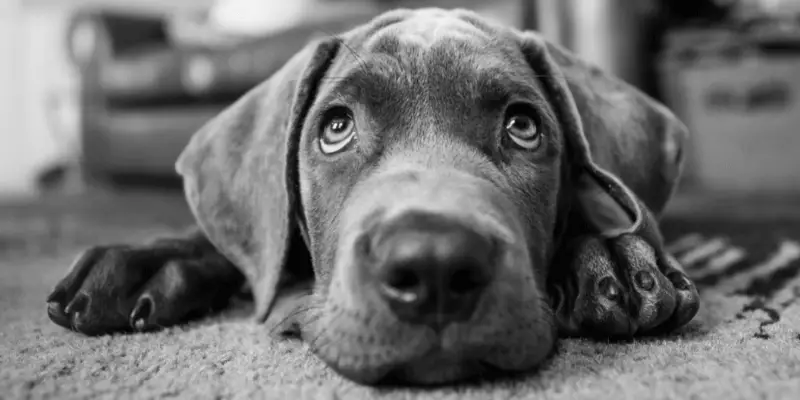
What can you do to help your puppy stop wetting?
As challenging as it might sound, you actually have to wake up and wake your puppy up too in the middle of the night so that they have a pee outside instead of in their bed.
By the time they reach the age of 6 months, they will have most likely learned to control their peeing instincts. They will therefore be able to hold it for longer periods of time.
In the beginning, you should take your puppy out for a walk before you go to sleep and twice a night. As your dog grows older, you can take them out for a pee only once a night until they can eventually hold their pee until the morning.
Another good way to prevent bedwetting at night would be to avoid giving your dog water right before they go to sleep. Around two hours before bedtime, take their water bowl. If they are still hungry, you can give them a pouch of wet food (or half), but refrain from allowing them to drink a lot of water.
Every puppy is different, so their peeing schedule might be unique. For example, at 8 weeks, they can only hold their pee for a couple of hours – no more than that.
At 12 weeks, accidents start to become rarer, but they can still happen every now and then. Once your puppy is 6-months-old, bedwetting will be very infrequent. So, it is only a matter of adjusting your schedule and routine depending on your dog’s age and behavior.
Are there any differences between male and female dogs?
Male dog peeing in its sleep
In males, incontinence is much less common than in females. If you see your male puppy peeing in their sleep, it’s probably a result of whatever they are dreaming.
Sometimes, pups can dream that they meet other, more dominant dogs, so their peeing reflex might be caused by submission. This can also happen when they are awake. Scared or submissive dogs are more likely to pee themselves.
Male dogs can pee in their sleep right after being neutered or once several months after the procedure has gone by.
Female dog peeing in its sleep
Female dogs have a much higher chance of experiencing nocturnal urinary incontinence compared to their male counterparts.
Unfortunately, they are also more likely to develop urinary tract infections, some of which can be quite resistant to antibiotics.
If a female puppy releases a couple of drops of pee every single night, even though you’re doing your best to take them out or wake them up for potty training, it could be a sign that they have an infection. Go to the vet to have their urine tested.
In North America and other countries, female dogs can sometimes be spayed early, sometimes when they reach the age of 5 months.
After this happens, the puppy might experience incontinence following the procedure, which is something completely normal.
If they are still under the effect of the anesthetic, they are effectively incapable of controlling their reflexes; so our best piece of advice for you would be to cover your dog’s bed as best as possible because it’s most likely going to get soiled

Can puppies have nightmares and pee?
Yes – Dogs can pee in their sleep just like babies and even human adults do, especially if they are experiencing a particularly frightening dream.
As you might have noticed if you have ever cared for a puppy before, they tend to dream quite a bit, especially when they are very young.
They can have several different dreams throughout a sleep session.
Dogs dream of all sorts of experiences, but most of them are quite mundane. However, when they do dream of something out of the ordinary, such as another dog that might put them in danger or threaten them or the possibility of their owners giving them a bath, they might bark, twitch or wet their beds.
By the way, if they dream of water, especially swimming in a pool, river, or the sea, they might also pee for this reason.
Final thoughts
House training requires a lot of repetition, patience, and relentlessness. If you make the mistake of thinking that your dog is potty trained before they actually are, they might wet their bed even if you don’t expect them to.
Until they reach the age of 1 and even beyond, dogs need to be trained almost continuously. Make sure to reward your puppy for peeing in the right places and associate certain words with the action itself (such as ‘go potty’).
During the first few months of their life, take your dog to the vet as per their recommendations. Dogs need to be vaccinated against potentially lethal diseases that they can easily catch from other animals. Your vet might also be able to recommend a trainer if you need some professional help.
References
- Canine Incontinence, Mark J. Acierno et al, 2019 https://pubmed.ncbi.nlm.nih.gov/30736891/
- Spaying and urinary incontinence in bitches under UK primary veterinary care: a case-control study, C. Pegram et al, 2019 https://www.ncbi.nlm.nih.gov/pmc/articles/PMC6850460/
- Urinary incontinence in male dogs under primary veterinary care in England: prevalence and risk factors, J. L. Hall et al, 2019 https://pubmed.ncbi.nlm.nih.gov/30387152/
- Urinary incontinence in castrated female dogs. Therapy, C. Blendinger et al, 1995 https://pubmed.ncbi.nlm.nih.gov/8578574/
- Puppy Potty Training Timeline and Tips, Harriet Meyers with American Kennel Club, 2019 https://www.akc.org/expert-advice/training/potty-training-your-puppy-timeline-and-tips/

Written by: Dr. Cristina Vulpe
Dr. Cristina Vulpe is a certified veterinarian who graduated in 2011 and earned her PhD in canine oncology in 2015, with a thesis focused on the diagnosis of abdominal tumors in dogs.

